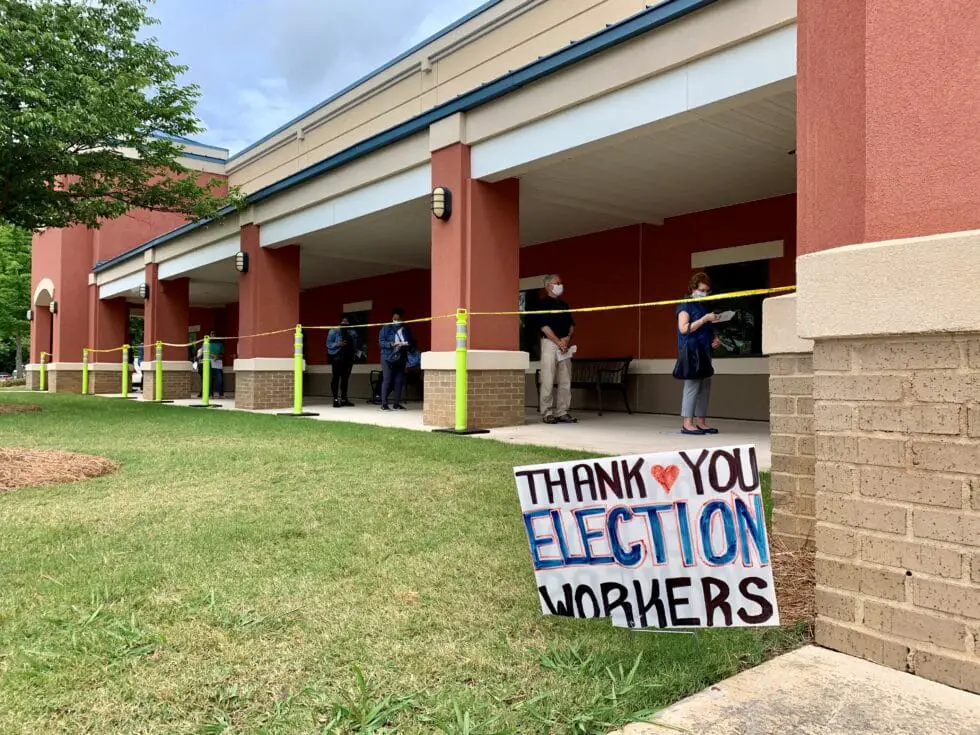Early voting for the June 9 primary in Georgia started Monday amid ongoing safety concerns stemming from the coronavirus pandemic coupled with close scrutiny over how the state’s new voting machines perform.
On the ballot are elections for federal, state and local offices plus the presidential preference primary, which has twice been delayed since its original March 24 date due to coronavirus. The general election will be held on Nov. 3. Runoffs, if needed, would be held on Aug. 11.
More than 40 sitting state lawmakers running for reelection in the General Assembly have drawn primary opponents. And several of the state’s 13 congressional seats are being hotly contested by Republican and Democratic candidates in metro Atlanta and North Georgia.
The three-week early voting period comes as county election officials roll out sanitizing and social-distancing measures aimed at reducing coronavirus risks in precincts, such as by cleaning ballot machines with sanitizing wipes and spreading out voters waiting in line.
Secretary of State Brad Raffensperger said Monday local precincts are spacing voters six feet apart while in line and providing poll workers with masks and gloves. Voters are being urged but not required to wear masks, Raffensperger said.
Precincts are also giving voters stylus pens to make ballot selections on touchscreens that are wiped before and after each use, Raffensperger said. Hand sanitizer is also available at precincts.
Raffensperger said he feels confident precincts will be ready to receive larger crowds on June 9 for Election Day.
“They’ll make it happen,” Raffensperger said Monday. “It’ll be a victory. It might be a rough one, but at the end of the day it will be a victory. People that want to vote will be able to vote.”
Early voting for the June 9 primary also will mark one of the first statewide uses of the new $104 million voting machines, which involve touchscreens and scanners that record a paper print-out of a voter’s completed ballot. The old machines in use since 2002 have been scrapped over cybersecurity issues.
State officials hail the new machines as more secure than the old all-electronic machines, while many critics have continued pushing through federal lawsuits for entirely paper ballots.
Purchased last July from Dominion Voting Systems, the new machines were on a tight timeline to roll out ahead of the March 24 presidential preference primary and saw a handful of glitches during a six-county test run last November.
Raffensperger said the new machines “are working great” just as they did for a shortened early-voting period that took place ahead of the then-scheduled March 24 presidential preference primary.
Beyond the new machines, coronavirus has upended the normal voting process in Georgia in ways that have spurred a huge push for absentee ballots and litigation aimed at delaying in-person voting.
As of Monday, Raffensperger said county officials had collected about 300,000 absentee ballots out of the nearly 1.5 billion ballots requested statewide, a figure already dwarfing the roughly 223,000 mail-in ballots cast in the high-turnout 2018 gubernatorial election.
Last week, a federal judge dismissed a lawsuit seeking to delay the primary again to the end of June and for officials to shelve the new touchscreens in favor of paper ballots. The suit argued the screens cannot be cleaned often enough to prevent coronavirus transmissions at precincts.
Meanwhile, dozens of state lawmakers seeking reelection to the General Assembly have been handcuffed by rules preventing them from campaign fundraising while the legislature remains suspended until later next month – even as their primary challengers have been allowed to raise cash.
The fundraising prohibition has not affected candidates for high-profile congressional races, particularly for both of Georgia’s U.S. Senate seats.
Roughly a half-dozen Democratic candidates vying for the seat held by U.S. Sen. David Perdue, a Republican, will be on the primary ballot. The primary pits several high-profile Democratic challengers including Sarah Riggs Amico, Jon Ossoff and Teresa Tomlinson.
Heated primary contests are also being held in the 6th, 7th, 11th and 13th congressional districts in metro Atlanta; the 9th Congressional District in Northeast Georgia; and the 14th Congressional District in Northwest Georgia.
The state’s other U.S. Senate contest for U.S. Sen. Kelly Loeffler’s seat will not be on the June 9 primary ballot since it is being held as a free-for-all open election between candidates of all parties on Nov. 3.


